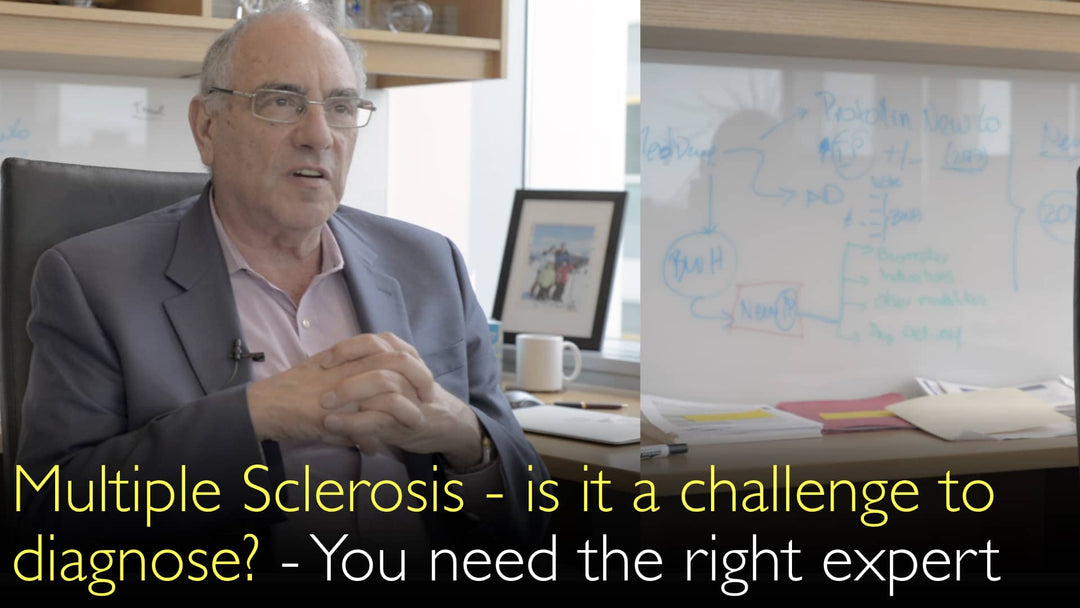Leading expert in multiple sclerosis, Dr. Howard Weiner, MD, explains how modern diagnostics have transformed MS diagnosis. He clarifies that MRI scans and spinal taps make accurate diagnosis straightforward. Dr. Howard Weiner, MD, emphasizes that diagnostic delays often stem from not seeing the right specialist. He discusses the critical role of neurological experts in interpreting test results. Timely and correct multiple sclerosis diagnosis is now highly achievable with proper medical evaluation.
Accurate Multiple Sclerosis Diagnosis with MRI and Expert Evaluation
Jump To Section
- Modern MS Diagnosis Tools
- Overcoming Diagnostic Delays
- Role of Specialist Referral
- Addressing Vague Neurological Symptoms
- Ensuring Timely MS Diagnosis
- Full Transcript
Modern MS Diagnosis Tools
Multiple sclerosis diagnosis has been revolutionized by advanced imaging technology. Dr. Howard Weiner, MD, states that MRI scans provide crucial evidence for identifying MS. The spinal tap, or lumbar puncture, offers additional diagnostic confirmation by detecting specific biomarkers. These tools have dramatically reduced diagnostic uncertainty in neurology. Dr. Anton Titov, MD, highlights how these technologies have changed patient outcomes.
Overcoming Diagnostic Delays
Diagnostic delays in multiple sclerosis often occur when patients present with ambiguous symptoms. Dr. Howard Weiner, MD, acknowledges that some patients experience years of unexplained neurological issues. He notes that these cases typically involve insufficient diagnostic testing rather than the disease's complexity. Early and comprehensive evaluation is key to preventing prolonged diagnostic uncertainty. Dr. Anton Titov, MD, discusses the importance of recognizing early MS signs.
Role of Specialist Referral
Consulting a multiple sclerosis specialist is critical for accurate diagnosis. Dr. Howard Weiner, MD, emphasizes that expert neurologists can properly interpret MRI and spinal fluid results. General practitioners may lack specific training to identify subtle MS indicators. Timely referral to a specialist can significantly shorten the diagnostic journey. Dr. Anton Titov, MD, explores the value of specialist input in complex cases.
Addressing Vague Neurological Symptoms
Vague symptoms like fatigue or numbness can delay multiple sclerosis diagnosis. Dr. Howard Weiner, MD, explains that these non-specific manifestations often lead to initial misdiagnosis. Persistent or worsening symptoms should prompt thorough neurological investigation. Patients must advocate for advanced testing when symptoms remain unexplained. Dr. Anton Titov, MD, discusses the challenge of connecting diffuse symptoms to MS.
Ensuring Timely MS Diagnosis
Timely multiple sclerosis diagnosis requires proactive medical evaluation and appropriate testing. Dr. Howard Weiner, MD, confirms that most patients can receive a correct diagnosis with current protocols. Access to neurological expertise and advanced imaging facilities is essential. Public awareness of MS symptoms can help patients seek specialized care earlier. Dr. Anton Titov, MD, highlights the importance of reducing diagnostic latency for better treatment outcomes.
Full Transcript
Dr. Anton Titov, MD: Multiple sclerosis diagnosis and treatment has made enormous advances in recent years. Yet multiple sclerosis remains a challenge to diagnose.
For example, a famous BBC journalist, Carolyn Wyatt, has been struggling with undiagnosed symptoms for 25 years. She was only diagnosed with multiple sclerosis after she was paralyzed on her left side.
Why does multiple sclerosis remain a diagnostic challenge today?
Dr. Howard Weiner, MD: Actually, multiple sclerosis isn't that much of a diagnostic challenge. We have the MRI scan. It is much, much easier to diagnose multiple sclerosis.
Sometimes individual patients might have a problem, but the problem isn't the diagnosis of multiple sclerosis. The problem is the treatments. The problem sometimes is trying to help patients who have multiple sclerosis, although we do have effective treatments.
I wouldn't say that is a major problem with multiple sclerosis. I know this person may have had difficulty, and there may be some diseases that are hard to diagnose, but multiple sclerosis isn't one of them.
Dr. Anton Titov, MD: Some patients have vague symptoms. Then after many years of struggle, they are receiving a multiple sclerosis diagnosis. What could have gone wrong in their long history of symptoms?
Why were they still without the correct diagnosis? You can read about such situations in literature. It happens occasionally with well-known patients.
Dr. Howard Weiner, MD: Yes. They may not have had the right diagnostic tests. With the MRI scan and with the spinal tap, most patients can be diagnosed correctly with multiple sclerosis.
Dr. Anton Titov, MD: That is not a problem once patients reach appropriate experts?
Dr. Howard Weiner, MD: That is correct.
Dr. Anton Titov, MD: It is a matter of reaching the right expert?
Dr. Howard Weiner, MD: Yes, reaching the multiple sclerosis expert and getting an MRI scan done is crucial to the correct diagnosis.
Multiple sclerosis can be diagnosed in a timely fashion if MRI and lumbar puncture are done and reviewed by appropriate experts. However, many people are misdiagnosed or have significant delays in diagnosis.







